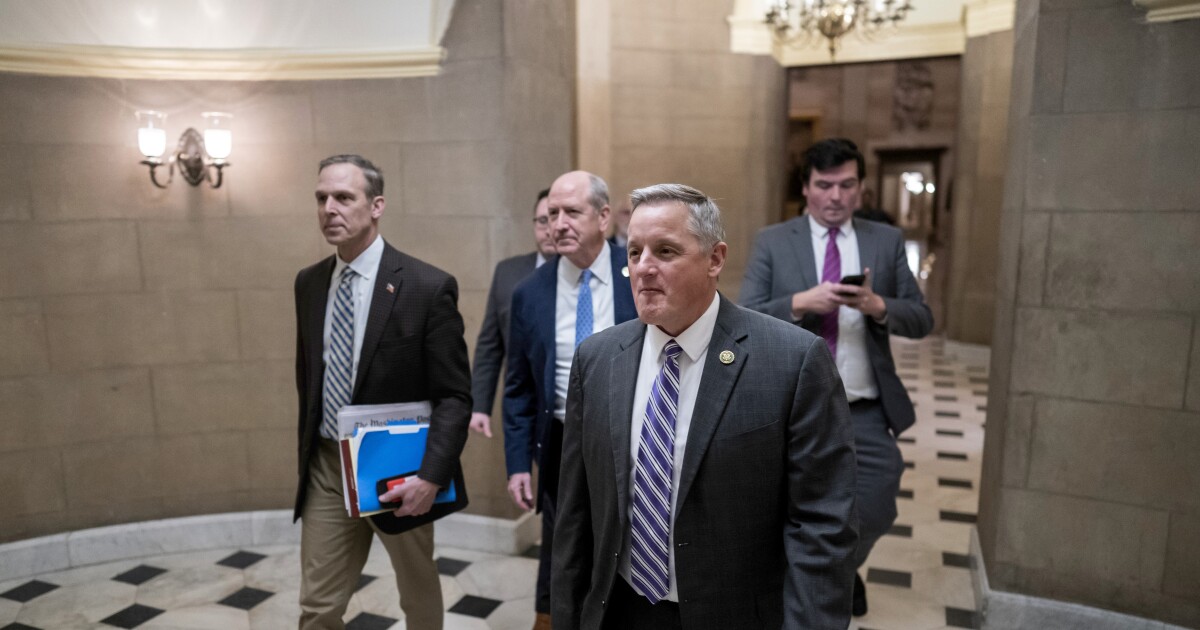

House Republicans are having their first go at energy “permitting reform” of the new Congress, an issue that dominated the waning days of the previous session and remains one of a handful of issues for which there’s considerable bipartisan support.
The House Natural Resources Committee is holding initial legislative hearings Tuesday to consider a suite of energy permitting reform bills, hoping to advance a long-standing legislative priority on which Republicans and Democrats have long failed to find consensus due to differing opinions over which kinds of energy projects to support.
A LOOK AT ENERGY AND COMMERCE’S FIRST LEGISLATIVE PUSH
It’s the first concrete movement on this hot legislative area in the new session and comes months after a Democratic proposal from Sen. Joe Manchin (D-WV) designed to speed up approval and construction of new energy projects took center stage during spending negotiations but repeatedly failed to pass the Senate in the final days of 2022.
That proposal from Manchin, which got President Joe Biden’s endorsement but was opposed by many liberal Democrats and many Republicans, was drawn up in the context of a unified Democratic government and without Republicans at the negotiating table.
Now, with a majority in the lower chamber, Republicans are pushing solutions of their own, some of which are seeing their second and third lives after being proposed in previous Congresses.
The committee will hold two hearings Tuesday to consider three separate bills dealing with different aspects of mining law and environmental and permitting procedures, which Republicans have wanted to reform for years in order to make it easier for project developers to build pipelines and other energy infrastructure.
A bill by Chairman Bruce Westerman (R-AR) would codify Trump-era regulations implementing the National Environmental Policy Act, which sought to put clearer timelines by which government agencies would have to abide so as to cut down on review periods and restricted agencies’ reviews to the anticipated “direct” impacts of a project.
The Biden administration rolled back and replaced the Trump-era NEPA regulations with its own prioritizing, which directs agencies to consider direct, indirect, and cumulative impacts of a proposed project so as to determine how it will contribute to climate change.
Westerman’s bill would also expressly exempt certain activities, such as repair to electric transmission lines, from being considered “major actions” in need of full environmental analysis under NEPA.
NEPA, the Clean Water Act, and the Endangered Species Act are among the series of premier environmental laws governing the construction of major infrastructure. Opponents of things such as new roads, pipelines, and wind energy projects have frequently held up projects by suing and successfully arguing relevant federal agencies failed their duties in reviewing and permitting a given project’s environmental impact under the laws.
Another bill from Rep. Garret Graves (R-LA) would also amend NEPA and require multiple agencies reviewing a project to get together and deem one among them the “lead agency,” a measure meant to speed up the review process.
The third bill, from Rep. Pete Stauber (R-MN), who chairs the Energy and Mineral Resources Subcommittee, would set time limits on environmental reviews.
“Without significant reforms, there’s nothing to stop [environmental reviews] from getting longer and longer,” a Republican committee aide told reporters ahead of the hearing.
A number of Democrats back permitting reform, a broad term referring to the cutting of red tape to speed the construction of energy infrastructure.
Democrats’ main interest in the effort is installing more wind and solar power infrastructure, energy sources central to their agenda to slow climate change.
Manchin’s bill would have required the president to identify traditional fossil fuel energy projects, along with renewable energy and mining, that should be prioritized by federal agencies.
It also sought to put a statute of limitations on litigation against projects, something many liberal Democrats opposed, alongside the bill’s attempt to approve the Mountain Valley Pipeline fully. The MVP is a natural gas pipeline originating in Manchin’s home state that is largely complete but has been bogged down by environmental reviews and court fights.
All but a handful of Democratic senators backed Manchin’s bill in December, even climate “hawks” such as Sen. Brian Schatz (D-HI) and Sheldon Whitehouse (D-RI).
CLICK HERE TO READ MORE FROM THE WASHINGTON EXAMINER
A few Republicans supported the bill, but most opposed it on the grounds that they did not want to serve Manchin’s legislative deal with Senate Majority Leader Chuck Schumer (D-NY), which provided that the Senate would vote on his permitting bill if Manchin voted for Democrats’ Inflation Reduction Act with its $369 billion in clean energy provisions — one Republicans uniformly opposed.
Republican House Natural Resources Committee aides said leadership is in active talks with Manchin about how to reconcile differences over their permitting reform proposals.







